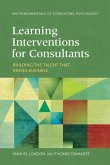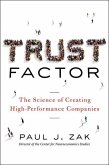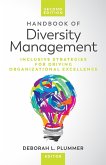Anger at Work
Prevention, Intervention, and Treatment in High-Risk Occupations
Herausgeber: Adler, Amy B; Forbes, David
Anger at Work
Prevention, Intervention, and Treatment in High-Risk Occupations
Herausgeber: Adler, Amy B; Forbes, David
- Broschiertes Buch
- Merkliste
- Auf die Merkliste
- Bewerten Bewerten
- Teilen
- Produkt teilen
- Produkterinnerung
- Produkterinnerung
This book helps researchers and practitioners identify problematic anger and evaluate its impact on job performance and in the workplace.
Andere Kunden interessierten sich auch für
![Yes, You Can Talk about Mental Health at Work Yes, You Can Talk about Mental Health at Work]() Melissa DomanYes, You Can Talk about Mental Health at Work15,99 €
Melissa DomanYes, You Can Talk about Mental Health at Work15,99 €![Our Racist Heart? Our Racist Heart?]() Geoffrey BeattieOur Racist Heart?37,99 €
Geoffrey BeattieOur Racist Heart?37,99 €![Awakening Compassion at Work Awakening Compassion at Work]() Monica C WorlineAwakening Compassion at Work24,99 €
Monica C WorlineAwakening Compassion at Work24,99 €![Learning Interventions for Consultants: Building the Talent That Drives Business Learning Interventions for Consultants: Building the Talent That Drives Business]() Manuel LondonLearning Interventions for Consultants: Building the Talent That Drives Business58,99 €
Manuel LondonLearning Interventions for Consultants: Building the Talent That Drives Business58,99 €![Leading Beyond Crisis Leading Beyond Crisis]() George S EverlyLeading Beyond Crisis17,99 €
George S EverlyLeading Beyond Crisis17,99 €![Trust Factor Trust Factor]() Paul ZakTrust Factor20,99 €
Paul ZakTrust Factor20,99 €![Handbook of Diversity Management Handbook of Diversity Management]() Handbook of Diversity Management27,99 €
Handbook of Diversity Management27,99 €-
-
-
This book helps researchers and practitioners identify problematic anger and evaluate its impact on job performance and in the workplace.
Hinweis: Dieser Artikel kann nur an eine deutsche Lieferadresse ausgeliefert werden.
Hinweis: Dieser Artikel kann nur an eine deutsche Lieferadresse ausgeliefert werden.
Produktdetails
- Produktdetails
- Verlag: American Psychological Association (APA)
- Seitenzahl: 336
- Erscheinungstermin: 27. Juli 2021
- Englisch
- Abmessung: 226mm x 151mm x 19mm
- Gewicht: 452g
- ISBN-13: 9781433833076
- ISBN-10: 1433833077
- Artikelnr.: 61503876
- Herstellerkennzeichnung
- Libri GmbH
- Europaallee 1
- 36244 Bad Hersfeld
- gpsr@libri.de
- Verlag: American Psychological Association (APA)
- Seitenzahl: 336
- Erscheinungstermin: 27. Juli 2021
- Englisch
- Abmessung: 226mm x 151mm x 19mm
- Gewicht: 452g
- ISBN-13: 9781433833076
- ISBN-10: 1433833077
- Artikelnr.: 61503876
- Herstellerkennzeichnung
- Libri GmbH
- Europaallee 1
- 36244 Bad Hersfeld
- gpsr@libri.de
Amy B. Adler and David Forbes
Contributors
Acknowledgments
Why Anger Matters: An Introduction
Amy B. Adler and David Forbes
I. Foundations
Chapter 1. An Overview of Anger: A Common Emotion With a Complicated
Backstory
Jeffrey M. Osgood and Phillip J. Quartana
Chapter 2. Anger as an Occupational Health Challenge for Employees in
High-Risk Occupations
Thomas W. Britt, Chloe A. Wilson, Eric B. Elbogen, Elizabeth E. Van
Voorhees, and Kirsten Dillon
II. Organizational Context
Chapter 3. Moral Injury and Anger in the Workplace
Andrea J. Phelps, Lisa Dell, and Kim Murray
Chapter 4. Emotional Culture and the Angry Team
Olivia (Mandy) O'Neill
Chapter 5. Anger and the Role of Supervisors at Work
Leslie B. Hammer, James D. Lee, Cynthia D. Mohr, and Shalene J. Allen
III. Clinical Context
Chapter 6. Anger in Occupations Characterized by Repeated Threat and Stress
Exposure: The Longitudinal View in the Military Context
Ellie Lawrence-Wood, Miranda van Hooff, and Alexander McFarlane
Chapter 7. The Cost of Anger: Suicide in the U.S. Army
James A. Naifeh, Oscar I. Gonzalez, Holly B. Herberman Mash, Carol S.
Fullerton, and Robert J. Ursano
Chapter 8. Clinical Interventions for Problematic Anger
Leslie A. Morland, Lisa H. Glassman, Margaret-Anne Mackintosh, and Paula P.
Schnurr
Chapter 9. Cognitive Bias Interventions
Gal Arad and Yair Bar-Haim
IV. Future Directions
Chapter 10. Advancing Anger Research
David Forbes and Amy B. Adler
Index
About the Editors
Acknowledgments
Why Anger Matters: An Introduction
Amy B. Adler and David Forbes
I. Foundations
Chapter 1. An Overview of Anger: A Common Emotion With a Complicated
Backstory
Jeffrey M. Osgood and Phillip J. Quartana
Chapter 2. Anger as an Occupational Health Challenge for Employees in
High-Risk Occupations
Thomas W. Britt, Chloe A. Wilson, Eric B. Elbogen, Elizabeth E. Van
Voorhees, and Kirsten Dillon
II. Organizational Context
Chapter 3. Moral Injury and Anger in the Workplace
Andrea J. Phelps, Lisa Dell, and Kim Murray
Chapter 4. Emotional Culture and the Angry Team
Olivia (Mandy) O'Neill
Chapter 5. Anger and the Role of Supervisors at Work
Leslie B. Hammer, James D. Lee, Cynthia D. Mohr, and Shalene J. Allen
III. Clinical Context
Chapter 6. Anger in Occupations Characterized by Repeated Threat and Stress
Exposure: The Longitudinal View in the Military Context
Ellie Lawrence-Wood, Miranda van Hooff, and Alexander McFarlane
Chapter 7. The Cost of Anger: Suicide in the U.S. Army
James A. Naifeh, Oscar I. Gonzalez, Holly B. Herberman Mash, Carol S.
Fullerton, and Robert J. Ursano
Chapter 8. Clinical Interventions for Problematic Anger
Leslie A. Morland, Lisa H. Glassman, Margaret-Anne Mackintosh, and Paula P.
Schnurr
Chapter 9. Cognitive Bias Interventions
Gal Arad and Yair Bar-Haim
IV. Future Directions
Chapter 10. Advancing Anger Research
David Forbes and Amy B. Adler
Index
About the Editors
Contributors
Acknowledgments
Why Anger Matters: An Introduction
Amy B. Adler and David Forbes
I. Foundations
Chapter 1. An Overview of Anger: A Common Emotion With a Complicated
Backstory
Jeffrey M. Osgood and Phillip J. Quartana
Chapter 2. Anger as an Occupational Health Challenge for Employees in
High-Risk Occupations
Thomas W. Britt, Chloe A. Wilson, Eric B. Elbogen, Elizabeth E. Van
Voorhees, and Kirsten Dillon
II. Organizational Context
Chapter 3. Moral Injury and Anger in the Workplace
Andrea J. Phelps, Lisa Dell, and Kim Murray
Chapter 4. Emotional Culture and the Angry Team
Olivia (Mandy) O'Neill
Chapter 5. Anger and the Role of Supervisors at Work
Leslie B. Hammer, James D. Lee, Cynthia D. Mohr, and Shalene J. Allen
III. Clinical Context
Chapter 6. Anger in Occupations Characterized by Repeated Threat and Stress
Exposure: The Longitudinal View in the Military Context
Ellie Lawrence-Wood, Miranda van Hooff, and Alexander McFarlane
Chapter 7. The Cost of Anger: Suicide in the U.S. Army
James A. Naifeh, Oscar I. Gonzalez, Holly B. Herberman Mash, Carol S.
Fullerton, and Robert J. Ursano
Chapter 8. Clinical Interventions for Problematic Anger
Leslie A. Morland, Lisa H. Glassman, Margaret-Anne Mackintosh, and Paula P.
Schnurr
Chapter 9. Cognitive Bias Interventions
Gal Arad and Yair Bar-Haim
IV. Future Directions
Chapter 10. Advancing Anger Research
David Forbes and Amy B. Adler
Index
About the Editors
Acknowledgments
Why Anger Matters: An Introduction
Amy B. Adler and David Forbes
I. Foundations
Chapter 1. An Overview of Anger: A Common Emotion With a Complicated
Backstory
Jeffrey M. Osgood and Phillip J. Quartana
Chapter 2. Anger as an Occupational Health Challenge for Employees in
High-Risk Occupations
Thomas W. Britt, Chloe A. Wilson, Eric B. Elbogen, Elizabeth E. Van
Voorhees, and Kirsten Dillon
II. Organizational Context
Chapter 3. Moral Injury and Anger in the Workplace
Andrea J. Phelps, Lisa Dell, and Kim Murray
Chapter 4. Emotional Culture and the Angry Team
Olivia (Mandy) O'Neill
Chapter 5. Anger and the Role of Supervisors at Work
Leslie B. Hammer, James D. Lee, Cynthia D. Mohr, and Shalene J. Allen
III. Clinical Context
Chapter 6. Anger in Occupations Characterized by Repeated Threat and Stress
Exposure: The Longitudinal View in the Military Context
Ellie Lawrence-Wood, Miranda van Hooff, and Alexander McFarlane
Chapter 7. The Cost of Anger: Suicide in the U.S. Army
James A. Naifeh, Oscar I. Gonzalez, Holly B. Herberman Mash, Carol S.
Fullerton, and Robert J. Ursano
Chapter 8. Clinical Interventions for Problematic Anger
Leslie A. Morland, Lisa H. Glassman, Margaret-Anne Mackintosh, and Paula P.
Schnurr
Chapter 9. Cognitive Bias Interventions
Gal Arad and Yair Bar-Haim
IV. Future Directions
Chapter 10. Advancing Anger Research
David Forbes and Amy B. Adler
Index
About the Editors








